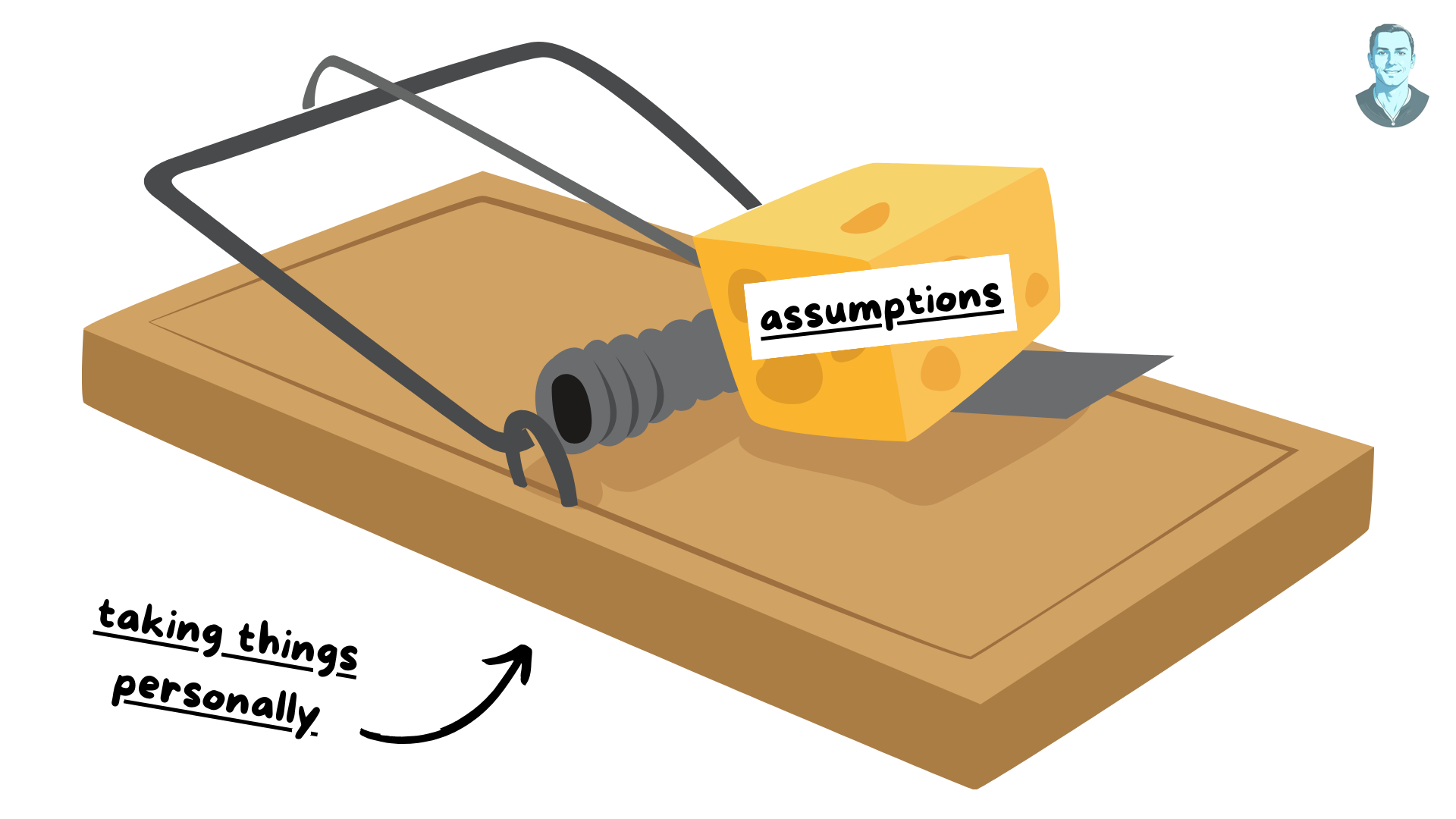“We make the assumption that everyone sees life the way we do.” — The Four Agreements by Don Miguel Ruiz, p. 69
After 25 years of life, I couldn’t be more set in my claim I’m about to make.
Most Americans take things too personally – and that includes me.
Taking things personally can be a rat trap, whereas assumption is the cheese.
The moment I became more conscious, I was exposed to my tendency of making assumptions, which led to me taking things personally.
Drowning in Self
Why is it that the majority of us take things personally? Is it because we don’t bear to ask the hard questions? Is it because it’s easier to take the shortcut to assume than take the long route of empathy, mercy, and understanding?
I continually ask myself, “I know it’s not beneficial, but why do I still have a tendency to take things personally sometimes?
When I’m too far gone in the loop of thinking about it, I also ask myself, “Why am I delayed in catching this tendency?”
The best thing I can actually do is attribute it to myself.
I’m thinking too much of myself.
I take responsibility for this.
It’s on me. No one else.
It takes a certain mental state to internalize interactions logically.
Emotional actions can be nutritious in certain contexts. For example, a coach disciplining his players for a mistake.
But most of the time, logic wins. More important than that, love wins.
Love is the mother of logic.
Let me give you a prime example.
In America, I’ve noticed that many individuals who are raised in the modern era don’t like to be questioned more than once.
Why so? There is a high view of self and of individualism.
If someone is questioned for their identity in something, it is seen as an immediate threat that will destroy their current worldview – feeling like the actual, external world is crumbling to ashes.
So, in a panicked frenzy, and even if it’s an objective truth for their own benefit, this someone will do whatever it takes to avoid truth – because the only pillar of truth holding them up is subjective.
Even if someone is questioned for why they did an ordinary task – and say that questioning sources from genuine curiosity – this someone will assume it as an attack on their actions. What if the person who questioned them just wanted to understand why they did what they did? That’s it.

Yes = Yes
When I finished reading The Four Agreements by Don Miguel Ruiz on October 14th, 2020, it enhanced my perspective as to how I can communicate with others.
But it first required me to deconstruct old ways of thinking.
With that said, I realized I had been orienting myself incorrectly when it came to taking offense.
Since I’ve been spending more time around my Russian teammates and friends, it has made me realize that cultures are different. Russians are direct. They’re blunt in their speech. They’re punctual. It’s just their way of living. That’s what they were taught and the behavior they adopted from growing up.
Since I grew up in America, I was conditioned a certain way. So, when I would converse with my Russian teammates, I was shocked to constantly hear a simple response of “yes” or ”da” (Russian for “yes”) to my questions.
I thought to myself: Why wasn’t there an explanation given after that “yes”? Is he mad at me for something? Did I do something wrong?
No. No. No.
Yes, literally meant YES.
That’s it.
A Mountain Has More Than One Side
To take something personal, means to look at what’s being said from only one perspective.
Reminder: not everyone sees life the way we do.
It’s like looking at a mountain from base camp.
From one person’s vantage point on the north side of the mountain, the mountain range can have a certain shape, with a different reception from the sun, and a different way of being climbed.
From another person’s vantage point on the south side of the mountain, the mountain, the sun, and the hike can be totally different. An entire 180 of a difference.
To take something personally, can mean we are viewing things from a singular, subjective point of view.
Just because you can’t be on all sides of the mountain at once, doesn’t mean you should neglect their existence.
It’s easy to think just about yourself. It takes a little more effort to think about others. Do what’s harder.
No matter how close the two words are in the dictionary, selfishness and service aren’t good friends. They don’t work well with each other.
“But I say to you, Do not resist the one who is evil. But if anyone slaps you on the right cheek, turn to him the other also. And if anyone would sue you and take your tunic, let him have your cloak as well.” – Matthew 5:39-40
Here is a YouTube video I recently posted in which I reflected on “detachment” in 2019 – as I read an excerpt from Tuesdays with Morrie by Mitch Albom:
Thanks to the one and only
of
for helping me trim the rough draft version of this essay and in being my reliable, helpful feedback sparing partner. The final version of this essay wouldn’t be what it is without his help.






